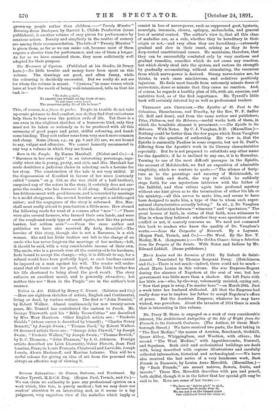Nervous Exhaustion : its Causes, Outcome, and Treatment. By Walter
Tyrrell, M.R.C.S. Eng. (Kogan Paul, Trench, and Co.)— We can claim no authority to pass any professional opinion on a work which, like this, is purely medical ; but we may draw our readers' attention to an interesting and, as it seems to a lay judgment, very sagacious view of the maladies which imply or
consist in loss of nerve-power, such as suppressed gout, hysteria, neuralgia, insomnia, chorea, epilepsy, melancholia, and general loss of mental control. The author's view is, that all this class of maladies are, as a rule, whether they be hereditary in their origin or not,—and very often they are hereditary,—extremely gradual and slow in their onset, arising as they do from deep-rooted constitutional causes. He maintains, therefore, that they can be successfully combated only by very cautious and gradual remedies, remedies which do not cause any reaction, but which slowly steal into the system, and restore its strength by gradually accumulating, without stimulating, the resources from which nerve-power -is derived. Strong nerve-tonics are, he thinks, in such cases mischievous, and sedatives positively injurious. He finds most benefit from extremely minute doses of nerve-tonic, doses so minute that they cause no reaction. And, of course, ho regards a healthy plan of life, with air, exercise, and nutritive food, as of the first importance. Mr. Tyrrell's little book will certainly interest lay as well as professional readers.


































 Previous page
Previous page